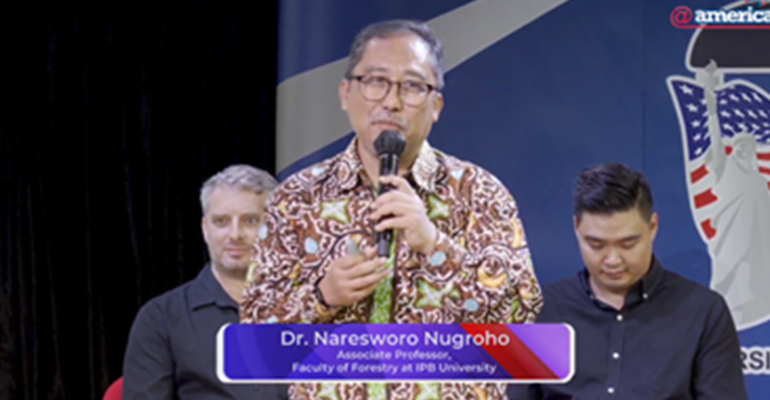Professor of Biomaterial Engineering IPB University Reveals the Potential of Mass Timber as a Modern Construction Material

Prof Naresworo Nugroho, Professor of Biomaterial Engineering at IPB University, explained the potential of engineered wood resources or mass timber as a modern building construction material. The presentation was delivered at a talk show with the theme ‘Modern Wood is Good’ broadcast by @america, 25/7.
Prof Naresworo explained that wood is an environmentally friendly and renewable material. He also mentioned that wood has various advantages that make it an ideal choice for construction.
“Wood is a renewable material that can be recycled, is aesthetic, and durable. Many traditional wooden houses are still well preserved today. Not only that, wood also has properties such as soundproofing, heat insulation, and comfort that make it very suitable for various construction purposes,” he said.
He revealed that one important aspect of engineered wood is its ability to reduce energy consumption and carbon emissions compared to conventional construction materials such as brick, steel and concrete.
“Wood is called an eco-friendly and green material because it has low embodied energy and can bind carbon,” explained Prof Naresworo Nugroho, Dean of the Faculty of Forestry and Environment (Fahutan) IPB University.
Prof Naresworo said IPB University had conducted research related to engineered wood technology, including magnetic wood as a conductor and ultra-lightweight home insulation panels from palm trunk waste. The results showed that the use of wood in construction and the furniture industry was not only environmentally friendly but also innovative.
“This engineered wood technology offers advantages in terms of strength, sustainability and safety, and can be an efficient alternative to conventional materials,” Prof Naresworo said.
However, he said, the challenge facing the mass timber industry is that it needs to adjust to the latest technology in refabrication and Cross-Laminated Timber (CLT) panelisation systems. Nonetheless, there are great opportunities for a new generation of modern biomaterial-based buildings to capitalise on these technological advances.
Prof Naresworo also highlighted that people’s preference for wood for furniture and attractives is still high, despite the timber industry in Indonesia facing a decline in production and exports.
“With continuous research and innovation, IPB University is committed to developing engineered wood technology and advancing the mass timber industry as a sustainable solution in modern building construction,” he emphasised. (MW/ra/Rz) (IAAS/RUM)



